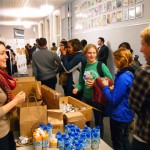Food Day 2013 Recap

On October 24th, Northwestern students consumed healthy, free fare and knowledge about the issues facing the global food industry for the annual Food Day on campus. Local farmers and federal employees joined forces to discuss the different ways food impacts everyday life.
NU Cuisine kicked off Food Day at the Rock with a Farmers' Market. The Eat Real Fair showcased student research on sustainable agriculture. The event showcased the produce of local farmers to highlight the problems large, corporate farms present when they crowd these farmers out of the market.
The showcase event, the food wheel, explained the impact food has on the world, covering topics like food access and industrial agriculture. Many voices were represented on the wheel that explained different perspectives on the state of food. One of the rungs on the wheel was devoted to sustainable agriculture. It focused on produce that is healthy to both the consumer and the land on which it is grown.
"When you have these large, industrial farms, the issue is that animals are given too many growth hormones," said Soad Mana, co-coordinator of NU Food Day. "It's still not proven what the effect of this is on our bodies."
These tactics, known as Concentrated Animal Feeding Operations, have lead to situations where chickens cannot fly because, according to Mana, they are too fattened by the cocktail of hormones they are fed.
"It's completely unethical and goes with a lot of the others problems the food wheel shows, like in this case, animal rights," the Weinberg senior said.
To prepare for the national Food Day, NU Food Day worked together with Campus Kitchens in the Norris University Center on October 23. The committee made peanut better and jelly sandwiches for the homeless in Evanston to touch on the issue of hunger in America.
"Most students don't realize that many people in Evanston are food insecure," said Sarah Suh, who presented at the Campus Kitchen stand. "Since we're not really in the low-income areas of the city, we'd like to show the students that this is a real problem."
Later that day, Wild Roots held at workshop at the Wild Roots garden to teach students and the community how to plant and grow their own food. The event highlighted food sustainability and organic alternatives in the American food system.
The Muslim Student Cultural Association, Om and Veg Society participated later that evening in a fishbowl discussion on the personal, spiritual and diverse ways to look at food.
"Food Day is whatever a person can make it," Mana said. "At the center of this whole wheel though, we want people to eat healthy."
At the keynote event, local advocacy groups and Alan Shannon, the US Department of Agriculture representative for the Midwest region, came together to discuss how to combat the unhealthy trends emerging in the global food system.
Shannon explained that the department's MyPlate program provides nutritious and affordable meals to children. The program works with partners in Illinois to tackle food deserts, which are regions where fresh food cannot be bought within a seven-mile radius.
According to Shannon, the best way to help people make better food decision is through education. Misinformation on food should be tackled through various initiatives, he said. The Know Your Farmer, Know Your Food website addresses food issues in local areas to entice people to eat healthily.
"Incentives are a great way to get the behavior we like to see without being punitive or without carrying a Big Stick to get people to buy the things we'd like them to buy," Shannon said.
These themes are reflected by NU Sustainable Food Talks, an organization that worked with Food Day to spread awareness. Tiffany Ozmina, Administrative Assistant in the Chemistry of Life Processes Institute, said the events sparked a dialogue among students.
These panels seek to close the gap between what Food Day co-coordinator Christine Gou referred to as Americans' "distant relationship with their food."
"The relationship translates into a guilty relationship," she said. "One of the reasons I wanted to bring this to Northwestern is because students are stressed. And when they're stressed, they eat. And we should know what we're putting into our bodies."
Looking forward, later this month a panel will focus on urban agriculture around the United States. In December, Food Talks will tackle the intimate relationship between faith and food. Mark your calendars!
The post Food Day 2013 Recap appeared first on Spoon University.

